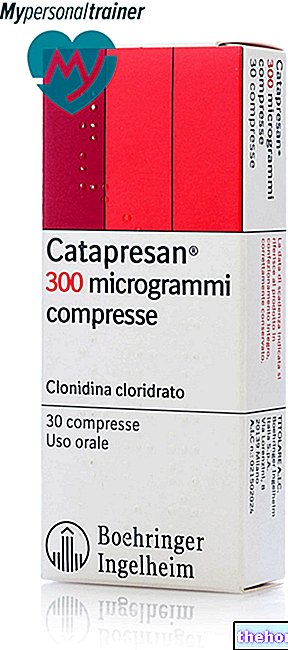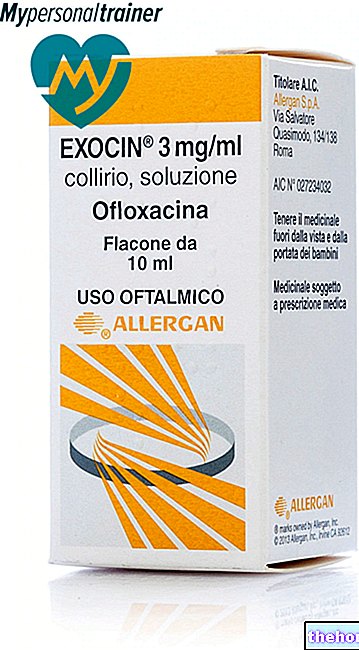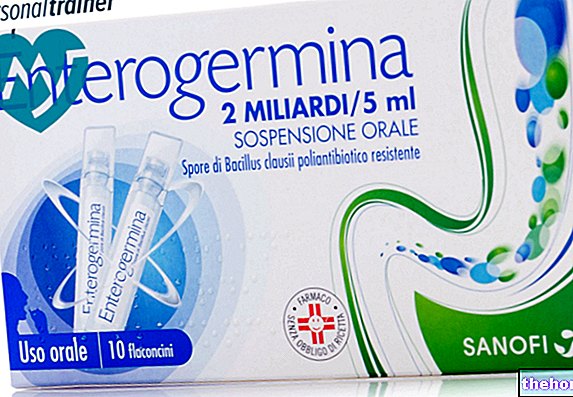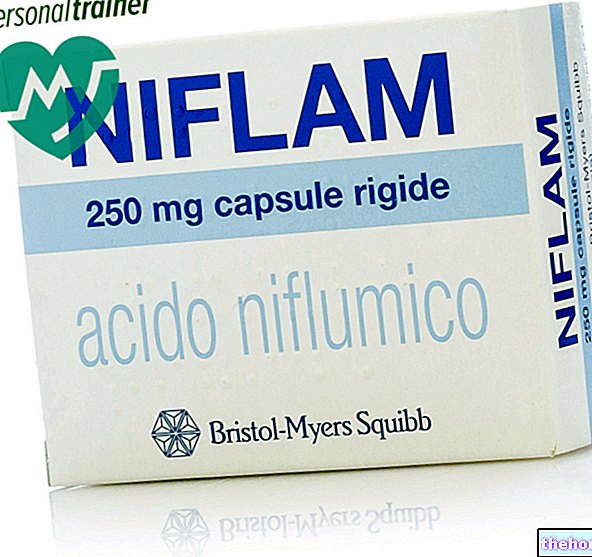Active ingredients: Sodium picosulfate, Magnesium oxide, Citric acid
Picoprep®, powder for oral solution
Indications Why is Picoprep used? What is it for?
Picoprep is a powder that contains sodium picosulfate, a laxative that works by increasing the activity of the intestine. Picoprep also contains magnesium citrate, another type of laxative that works by drawing water into the intestines to cause a flushing effect.
Picoprep is used in adults, adolescents and children from 1 year of age to clean the bowel before x-ray, endoscopy or before surgery.
Contraindications When Picoprep should not be used
Do not use Picoprep if:
- suffer from allergy (hypersensitivity) to sodium picosulfate or any of the other ingredients of this medicine (listed in section 6).
- have reduced stomach emptying capacity (gastric retention).
- have stomach or intestinal ulcers.
- suffer from severe kidney disease.
- have a bowel obstruction or perforation.
- at the moment he is ill or feeling unwell.
- must undergo abdominal surgery, for example for acute appendicitis.
- your doctor has told you that you have congestive heart failure (the heart does not pump blood effectively).
- you suffer from an active inflammatory bowel disease such as Chron's disease or ulcerative colitis.
- your doctor told you that your blood magnesium values are too high.
- are very thirsty or think you are severely dehydrated.
- her doctor told her that her muscles are damaged and that they are releasing their contents into the blood.
- suffers from:
- ileus (intestinal blockage or failure of normal bowel motility)
- toxic colitis (damage to the intestinal walls)
- toxic megacolon (large intestine expansion).
Under these conditions, movements of the intestinal contents can be reduced or prevented. Symptoms include nausea, vomiting, diarrhea, abdominal pain, tenderness or swelling, colic-like pain, and fever.
Precautions for use What you need to know before taking Picoprep
Take special care with Picoprep if:
- recently underwent abdominal surgery.
- suffer from heart or kidney problems.
- you suffer from inflammatory bowel diseases such as ulcerative colitis and Crohn's disease.
- are under 18, elderly or physically weak. You must ensure that you drink sufficient amounts of fluids and electrolytes during treatment
- you must take Picoprep before bowel surgery.
If any of the conditions described apply to you, or if you are not sure, contact your doctor before using Picoprep.
Interactions Which drugs or foods may change the effect of Picoprep
Tell your doctor or pharmacist if you are taking or have recently taken any other medicines, including medicines obtained without a prescription.
It is especially important to tell your doctor if you are already taking:
- bulk laxatives, for example bran.
- oral medicines prescribed by your doctor, especially if prescribed regularly as their effectiveness can be changed, for example contraceptives, antibiotics, antidiabetics, iron, penicillamines or antiepileptics. These medicines should be taken at least 2 hours before and not less than 6 hours after taking Picoprep.
- drugs that can upset the balance of fluids and / or electrolytes such as diuretics, steroids, lithium, digoxin, antidepressants, carbamazepine or antipsychotics.
Warnings It is important to know that:
Tell your doctor or pharmacist if you are taking or have recently taken any other medicines, including those obtained without a prescription.
It is especially important to tell your doctor if you are already taking:
- bulk laxatives, for example bran.
- oral medicines prescribed by your doctor, especially if prescribed regularly as their effectiveness can be changed, for example contraceptives, antibiotics, antidiabetics, iron, penicillamines or antiepileptics. These medicines should be taken at least 2 hours before and not less than 6 hours after taking Picoprep.
- drugs that can upset the balance of fluids and / or electrolytes such as diuretics, steroids, lithium, digoxin, antidepressants, carbamazepine or antipsychotics.
Pregnancy, breastfeeding and fertility
If you are pregnant or breast-feeding, think you may be pregnant or are planning to have a baby, ask your doctor or pharmacist for advice before using Picoprep.
Driving and using machines
Picoprep has no effect on the ability to drive and use machines. However, make sure you have quick access to a toilet for as long as the drug works after each dose, until it stops working.
Important information about some of the ingredients of Picoprep
Each sachet contains 5 mmol (or 195 mg) of potassium. If you have kidney problems or are on a potassium control diet, please talk to your doctor. This medicine also contains lactose. If you have been told by your doctor that you are intolerant to some sugars, please inform your doctor before taking this medicine.
Dose, Method and Time of Administration How to use Picoprep: Posology
Always use this medicine exactly as your doctor or pharmacist has told you. If in doubt, consult your doctor or pharmacist.
Picoprep powder should be dissolved in a cup of cold water (approximately 150ml). Mix 2-3 minutes and then drink the solution. Sometimes the solution heats up when Picoprep dissolves. If this happens, wait to drink until the solution becomes cold enough.
Adults (including the elderly) and children 9 years of age and older:
The usual dose is one sachet in the morning and one in the afternoon of the day before the procedure.
Take the first sachet before 8.00 am followed by at least five doses of 250 ml of clear liquids over several hours and the second sachet 6-8 hours later, followed by at least three doses of 250 ml of liquids clear over several hours.
Children (less than 9 years old):
Follow the times below
A measuring spoon is supplied with the product.
- From 1 to 2 years: 1 tablespoon in the morning, 1 tablespoon in the afternoon
- From 2 to 4 years: 2 tablespoons in the morning, 2 tablespoons in the afternoon
- From 4 to 9 years: 1 sachet in the morning (taken as described under "Adults"), 2 tablespoons in the afternoon
- From 9 years onwards: adult dose.
To measure the dose with the measuring spoon:
- Fill the spoon with some powder from the sachet.
- Pass the back of a knife over the surface of the measuring spoon.
- The powder left in the measuring cup corresponds to one tablespoon (4 g of powder).
- Pour the powder from the spoon into a cup of water. The cup must contain:
- Approximately 50ml of water if you are measuring one tablespoon of powder
- Approximately 100ml of water if you are measuring two tablespoons of powder
- Stir in the cup for 2-3 minutes.
- Drink the solution. Sometimes the solution becomes hot when Picoprep dissolves. If this happens, wait to drink until the solution becomes cold enough.
- Throw away any remaining powder in the sachet.
Frequent bowel emptying movements are expected which can occur at any time after drinking Picoprep. Be sure to have easy access to a bathroom for as long as you are being treated with Picoprep until the effect is worn out. .
To restore lost fluids, it is important to drink plenty of clear fluids during treatment with PICOPREP until bowel movements have stopped. In general, you should try to drink clear fluids when you are thirsty.
Clear liquids should include a variety of pulp-free fruit juices, sodas, broth, tea, coffee (without milk, soy, or cream), and water. Don't drink just water.
The success of the hospital procedure he undergoes depends on the degree of cleanliness of the bowel, which must be as clean as possible. The procedure may need to be repeated if the bowel is not sufficiently clean. Always follow your doctor's diet instructions.
If you forget to take Picoprep
Ask your doctor, pharmacist or nurse for advice.
Overdose What to do if you have taken too much Picoprep
If you take more Picoprep than you should, contact your doctor immediately or go to the nearest emergency room.
Side Effects What are the side effects of Picoprep
Like all medicines, Picoprep can cause side effects, although not everybody gets them.
There have been isolated reports of severe and prolonged abdominal pain in some patients suggestive of serious illness and requiring urgent medical attention and isolated cases of severe allergic reactions that may lead to difficulty in breathing.
There have also been isolated reports of mild ulcers in the small intestine.
If you have any allergic reactions or severe and prolonged abdominal pain, contact your doctor or go to the nearest emergency room immediately.
The known side effects of Picoprep are described below:
Common (less than 1 in 10 but more than 1 in 100 patients):
- Headache.
- Nausea.
- Proctalgia (pain in the anus).
Uncommon (less than 1 in 100 but more than 1 in 1000 patients):
- Rash and / or itching.
- Vomiting and severe diarrhea which can lead to dehydration with headache and confusion when there has not been appropriate fluid and salt replenishment.
- Abdominal pain.
- He retched.
- Low levels of sodium or potassium in the blood (hyponatremia or hypokalaemia) with or without associated seizures. Seizures have occasionally been reported in epileptic patients.
Other side effects of which the frequency is not known:
- As the main clinical effect, accentuated very regular bowel movements or diarrhea may occur. However, if these movements become bothersome or cause for concern, contact your doctor.
Reporting of side effects
If you get any side effects, talk to your doctor or pharmacist. This includes any possible side effects not listed in this leaflet. You can also report side effects directly via the national reporting system at www.agenziafarmaco.gov.it/it/responsabili. By reporting side effects you can help provide more information on the safety of this medicine.
Expiry and Retention
Keep this medicine out of the sight and reach of children.
Store in the original package to protect from moisture.
Single use. Remove any unused residue.
Do not use Picoprep after the expiry date which is stated on the carton (sachet).
Do not throw any medicines via wastewater or household waste. Ask your pharmacist how to throw away medicines you no longer use. This will help protect the environment.
Deadline "> Other information
What Picoprep contains
The active ingredients are: 10 mg of sodium picosulfate, 3.5 g of light magnesium oxide and 12 g of anhydrous citric acid.
The other ingredients are: potassium bicarbonate, sodium saccharinate and natural dry orange flavoring spray which contains acacia gum, lactose, ascorbic acid, butylated hydroxyanisole.
What Picoprep looks like and contents of the pack
Its medicine is called Picoprep and it is a powder for oral solution.
It is supplied in packs of 2 sachets, 100 sachets (50 packs, each containing 2 sachets) or 300 sachets (150 packs, each containing 2 sachets).
A measuring spoon is included in the package to ensure the correct dosage for children. The spoon is used to measure 4 g of powder (4.75 ml). You should use the spoon only for dosing in children under 9 years of age.
Not all pack sizes may be marketed.
Source Package Leaflet: AIFA (Italian Medicines Agency). Content published in January 2016. The information present may not be up-to-date.
To have access to the most up-to-date version, it is advisable to access the AIFA (Italian Medicines Agency) website. Disclaimer and useful information.
01.0 NAME OF THE MEDICINAL PRODUCT -
PICOPREP POWDER FOR ORAL SOLUTION
02.0 QUALITATIVE AND QUANTITATIVE COMPOSITION -
Each sachet contains the following active ingredients:
Sodium picosulfate 10.0 mg
Lightweight magnesium oxide 3.5 g
Citric acid anhydrous 12.0 g
Each sachet also contains:
Potassium bicarbonate 0.5 g [equivalent to 5 mmol (195 mg) of potassium]
Lactose (as a component of the flavor)
For the full list of excipients, see section 6.1.
03.0 PHARMACEUTICAL FORM -
Powder for oral solution.
White crystalline powder.
04.0 CLINICAL INFORMATION -
04.1 Therapeutic indications -
PICOPREP is indicated in adults, adolescents and children from 1 year of age:
• For bowel cleansing prior to x-ray or endoscopic examinations.
• For bowel cleansing prior to surgery, if deemed clinically necessary (see section 4.4 for open colorectal surgery).
04.2 Posology and method of administration -
Dosage
Adults (including the elderly):
Take the two sachets of PICOPREP following the timing provided by the procedure
• Take the first reconstituted sachet 10 to 18 hours prior to the start of the procedure, followed by at least five 250ml doses of clear liquids, over a period of several hours
• Take the second reconstituted sachet 4 to 6 hours before the procedure begins, followed by at least three 250ml doses of clear liquids, over a period of several hours
• Clear liquids can be consumed up to 2 hours before the procedure starts
Special populations
Limited data are available for the treatment of patients with low body weight (BMI less than 18). The above rehydration regimen has not been tested in such individuals, therefore monitoring of their hydration status is required and the regimen may need to be adjusted as appropriate (see section 4.4).
Pediatric population
A measuring spoon is supplied with the product. It is recommended to pass something flat and thin, such as the back of a knife blade, over the surface of the filled measuring spoon to make it flat. In this way you will get ¼ of a sachet (4 g of powder) per tablespoon.
For timing of administration in children, refer to the instructions provided for adults.
1-2 years: first dose of 1 tablespoon, second dose of 1 tablespoon
2-4 years: first dose of 2 tablespoons, second dose of 2 tablespoons
4-9 years: first dose of 1 sachet, second dose of 2 tablespoons
9 years and older: same dose as adult.
Method of administration
Route of administration: Oral
Instructions for reconstitution (Adults):
Reconstitute the contents of one sachet in a cup of water (approximately 150 ml). Stir for 2-3 minutes to form a whitish, opaque solution with a faint orange odor. Drink the solution obtained. If it gets hot, wait until it reaches a suitable temperature for drinking.
Instructions for reconstitution (pediatric population):
Reconstitute the required amount of powder in a cup containing approximately 50ml of water per tablespoon. Stir for 2-3 minutes to form a whitish, opaque solution with a faint orange odor. Drink the solution obtained. If it becomes lukewarm, wait until it reaches a suitable temperature for drinking.
Discard the content remaining in the sachet.
For instructions on reconstitution of the entire sachet in children 4-9 years old, see the instructions provided for adults.
A low residue diet is recommended the day before the procedure. A clear fluid diet is recommended on the day of the procedure. To avoid dehydration it is important to follow the recommendation to take fluids together with the PICOPREP dosage as long as the effects of PICOPREP persist (see section 4.2, Posology). In addition to the fluid intake associated with the therapeutic regimen (PICOPREP + additional fluids), a clear fluid intake according to normal thirst is recommended.
Clear liquids should include a variety of pulp-free fruit juices, sodas, broth, tea, coffee (without milk, soy, or cream), and water. Don't drink just water.
04.3 Contraindications -
• Hypersensitivity to the active substances or to any of the excipients listed in section 6.1
• Congestive heart failure
• Gastric retention
• Gastrointestinal ulcerations
• Toxic colitis
• Toxic megacolon
• Ileus
• Nausea and vomit
• Acute abdominal surgical conditions such as acute appendicitis
• Known or suspected gastrointestinal obstruction or perforation
• Severe dehydration
• Rhabdomyolysis
• Hypermagnesemia
• Active inflammatory bowel disease
• In patients with severely impaired renal function, plasma accumulation of magnesium may occur. In these cases, use a different preparation.
04.4 Special warnings and appropriate precautions for use -
Since no relevant clinical benefit of bowel cleansing can be demonstrated before elective open colorectal surgery, medicinal products used to clean the bowel in preparation for bowel surgery should only be administered if deemed strictly necessary. The risk of treatment should be carefully evaluated against the possible expected benefit and its necessity according to the surgical procedure adopted.
An "insufficient or excessive oral intake of water and electrolytes can create clinically significant deficiencies particularly in patients with poor health conditions. In this regard, patients with low body weight, children, the elderly, debilitated individuals and patients at risk of hypokalaemia or hyponatremia may need special attention. Prompt corrective actions should be taken to restore fluid / electrolyte balance in patients with signs or symptoms of hypokalaemia or hyponatremia.
Drinking only water to replace fluid losses can lead to an electrolyte imbalance.
Use with caution even in patients with recent gastrointestinal surgery, renal impairment, heart disease or inflammatory bowel disease.
Use with caution in patients being treated with drugs that can affect the water and / or electrolyte balance such as, for example, diuretics, corticosteroids, lithium (see section 4.5).
PICOPREP may affect the absorption of drugs normally prescribed for oral use and therefore should be used with caution. For example, isolated cases of seizures have been reported in patients receiving previously controlled antiepileptics (see sections 4.5 and 4.8).
The intestinal cleansing period should not exceed 24 hours as a more prolonged preparation can increase the risk of alterations in the hydro-electrolytic balance.
If the procedure is expected to start early in the morning, the second dose may need to be taken at night and possible sleep disturbances may occur.
This medicine contains 5 mmol (or 195 mg) of potassium in each sachet. This should be taken into consideration in the case of patients with impaired renal function or on a low potassium diet.
This medicinal product contains lactose as a flavoring component. Patients with rare hereditary problems of galactose intolerance, the Lapp lactase deficiency, or glucose-galactose malabsorption should not take this medicine.
PICOPREP should not be used as a routine laxative.
04.5 Interactions with other medicinal products and other forms of interaction -
As a purgative, PICOPREP increases the rate of gastrointestinal transit. The absorption of other oral medicinal products (eg antiepileptics, contraceptives, antidiabetics, antibiotics) may therefore be changed during treatment (see section 4.4). Tetracyclines and fluoroquinolones, iron, digoxin, chlorpromazine and penicillamines, should be taken at least 2 hours before and not less than 6 hours after PICOPREP administration, to avoid chelation with magnesium.
The efficacy of PICOPREP was diminished by bulk laxatives.
Caution should be exercised in the treatment of patients already being treated with drugs associated with hypokalaemia (such as diuretics or corticosteroids or drugs for which hypokalaemia is a particular risk, such as cardiac glycosides). Caution should also be exercised when using PICOPREP in patients being treated with NSAIDs or with drugs known to induce SIADH such as tricyclic antidepressants, selective serotonin re-uptake inhibitors, antipsychotic drugs and carbamazepine, as these drugs increase the risk of water retention and / or disturbances in balance electrolytic.
04.6 Pregnancy and breastfeeding -
Pregnancy
There are no clinical data on exposure with PICOPREP in pregnant women. Studies in animals have shown reproductive toxicity (see section 5.3). Since picosulfate is a stimulation laxative, it is preferable to avoid the use of PICOPREP during pregnancy for safety.
Fertility
There are no data on the effects of PICOPREP on fertility in humans.
Fertility in male and female rats was unaffected by oral doses of sodium picosulfate up to 100 mg / kg (see section 5.3).
Feeding time
There are no data on the use of PICOPREP during lactation. However, in view of the pharmacokinetic properties of the active substances, treatment with PICOPREP in breastfeeding women may be considered.
04.7 Effects on ability to drive and use machines -
Not relevant.
04.8 Undesirable effects -
The most frequent adverse reactions observed in clinical trials are nausea, headache and vomiting.
* Isolated cases of mild and reversible ileal aphthous ulcer have been reported.
The frequency of undesirable effects is based on post-marketing experience.
Diarrhea and fecal incontinence are the main clinical effects of PICOPREP. Isolated cases of severe diarrhea have been reported after marketing.
Hyponatremia with or without associated seizures has been reported. In epileptic patients, isolated cases of grand mal seizures / seizures without associated hyponatremia have been reported. Isolated cases of anaphylactoid reactions have been reported.
Reporting of suspected adverse reactions
Reporting of suspected adverse reactions occurring after authorization of the medicinal product is important as it allows continuous monitoring of the benefit / risk balance of the medicinal product. Healthcare professionals are asked to report any suspected adverse reactions via the national reporting system. "address www.agenziafarmaco.gov.it/it/responsabili.
04.9 Overdose -
An overdose causes profuse diarrhea. The treatment includes general support measures and corrective measures of the water and electrolyte balance.
05.0 PHARMACOLOGICAL PROPERTIES -
05.1 "Pharmacodynamic properties -
Pharmacotherapeutic group: Contact laxatives, ATC code: A06A B58.
The active ingredients of PICOPREP are sodium picosulfate and magnesium citrate. Sodium picosulfate is a locally active cathartic stimulant which, after bacterial cleavage in the colon forms the laxative compound, bis- (p-hydroxyphenyl) -pyridyl-2-methane (BHPM), which has a double action by stimulating both the mucosa and the "large intestine and rectum. Magnesium citrate acts by osmotic laxative action by retaining fluids in the colon. The combined action of the two active ingredients resulted in a washing effect combined with a stimulation of peristalsis for bowel cleansing."
The medicine is not intended for use as a routine laxative.
Clinical efficacy and safety
The dosing regimen, as described in section 4.2 Posology, and herein further referred to as the personalized dosing regimen, was studied and evaluated in trial 000121 (OPTIMA) which compared the efficacy, safety and tolerability of PICOPREP administered according to a customized dosing regimen versus a fixed dosing regimen (e.g. the first dose is taken before 8 am and the second dose 6-8 hours later the day before the procedure) called the "day before" dosing regimen ( 204 patients were randomized, 131 received the personalized dosing, 73 received the "day before" dosing).
In overall colon cleansing and ascending colon cleansing, the superiority of the personalized dosing regimen over the "day before" dosing has been demonstrated. For overall colon cleansing, the personalized dosing regimen was compared to the "day before" dosing regimen, based on the treatment difference in the mean total score on the Ottawa scale (4.26 versus 8.19 in the mean total score on the Ottawa scale, for the custom dosing regimen and the "previous day" dosing, respectively, with a corresponding p-value
Patients randomized to the personalized dosing regimen had a 4.05-fold greater probability of response in ascending colon cleansing than patients randomized to treatment with "day before" dosing.
* Difference in absolute risk (rough estimate)
** Relative risk (rough estimate)
05.2 "Pharmacokinetic properties -
Both active ingredients act locally in the colon and neither is absorbed in detectable quantities.
05.3 Preclinical safety data -
Prenatal development studies in rats and rabbits revealed no potential teratogenic effects after oral administration of sodium picosulfate but embryotoxic effects were observed in rats at doses of 1000 and 10000 mg / kg / day and in rabbits at doses of 1000 mg / kg / day. die. The corresponding safety margins were between 3,000 and 30,000 times the expected human dose. In rats, a daily dosage of 10 mg / kg in the last phase of gestation (fetal development) and during lactation reduces the weight and survival of the newborns. Male and female fertility in rats was not affected by the intake of sodium picosulfate at oral doses up to 100 mg / kg.
06.0 PHARMACEUTICAL INFORMATION -
06.1 Excipients -
Potassium bicarbonate
Sodium saccharinate
Natural flavor, dry orange spray, which contains acacia gum, lactose, ascorbic acid, butylated hydroxyanisole.
06.2 Incompatibility "-
Not relevant.
06.3 Period of validity "-
3 years.
Once opened, the sachet should be used immediately and any unused solution or powder should be discarded.
06.4 Special precautions for storage -
Store in the original package to protect from moisture.
06.5 Nature of the immediate packaging and contents of the package -
Sachet:
4 layers: paper-low density polyethylene-aluminum-thermolabile resin.
Pair of sachets that can be separated along the perforated tear-off line.
Weight of the content of each sachet: 16.1 g.
A measuring spoon for pediatric dosing is included in the package.
PICOPREP is supplied in packs of 2 sachets, 100 sachets (50 packs of 2 sachets) or 300 sachets (150 packs of 2 sachets).
Not all pack sizes may be marketed.
06.6 Instructions for use and handling -
Unused medicine and wastes derived from this medicine must be disposed of in accordance with local regulations.
07.0 HOLDER OF THE "MARKETING AUTHORIZATION" -
Ferring S.p.a. - Via Senigallia 18/2 - 20161 Milan
08.0 MARKETING AUTHORIZATION NUMBER -
AIC n. 039961014 - "POWDER FOR ORAL SOLUTION" 2 PAPER / LDPE / AL / RESIN BAGS OF 16.1 G
AIC n. 039961026 - "POWDER FOR ORAL SOLUTION" 50x2 PAPER / LDPE / AL / RESIN BAGS OF 16.1 G
AIC n. 039961038 - "POWDER FOR ORAL SOLUTION" 150x2 PAPER / LDPE / AL / RESIN BAGS OF 16.1 G
09.0 DATE OF FIRST AUTHORIZATION OR RENEWAL OF THE AUTHORIZATION -
February 2011
10.0 DATE OF REVISION OF THE TEXT -
AIFA Determination of 17 October 2016




























